All Management Events
- Security Framework using Blockchain Technology February 24, 2022
The Department of Computer Science Engineering is proud to announce that Dr Sriramulu Bojjagani has published a paper titled “Blockchain-Based Security Framework for Sharing Digital Images using Reversible Data Hiding and Encryption” in the journal Multimedia Tools and Applications (MTAP) having an impact factor of 2.757.
The paper is published in collaboration with D.R Denslin Brabin from the Department of Computer Science and Engineering, DMI College of Engineering, Tamil Nadu and Christo Ananth from the Department of Electronics and Communication Engineering, St. Mother Theresa Engineering College, Tamil Nadu.
Abstract of the Research
Security is an important issue in current and next-generation networks. Blockchain will be an appropriate technology for securely sharing information in next-generation networks. Digital images are the prime medium attacked by cyber attackers. In this paper, a blockchain-based security framework is proposed for sharing digital images in a multi-user environment. The proposed framework uses reversible data hiding and encryption as component techniques. A novel high-capacity reversible data hiding scheme is also proposed to protect digital images. Reversible data hiding in combination with encryption protects the confidentiality, integrity and authentication of digital images. In the proposed technique, the digital image is compressed first to create room for data hiding, then the user signature is embedded; afterwards, the whole image is encrypted. For compression, JPEG lossy compression is used to create high capacity. For encryption, any symmetric block cipher or stream cipher can be used. Experimental results show that the proposed blockchain-based framework provides high security and the proposed reversible data hiding scheme provides high capacity and image quality.

Fig 1: The process of encoding during reversible data hiding
Dr Sriramulu Bojjagani also intends to work on the development of block-chain based solutions to intelligent transport systems and on addressing the challenges of security issues involved in connected and autonomous vehicles.
- MBA at SRM AP – Career Prospects and Future Opportunities February 24, 2022
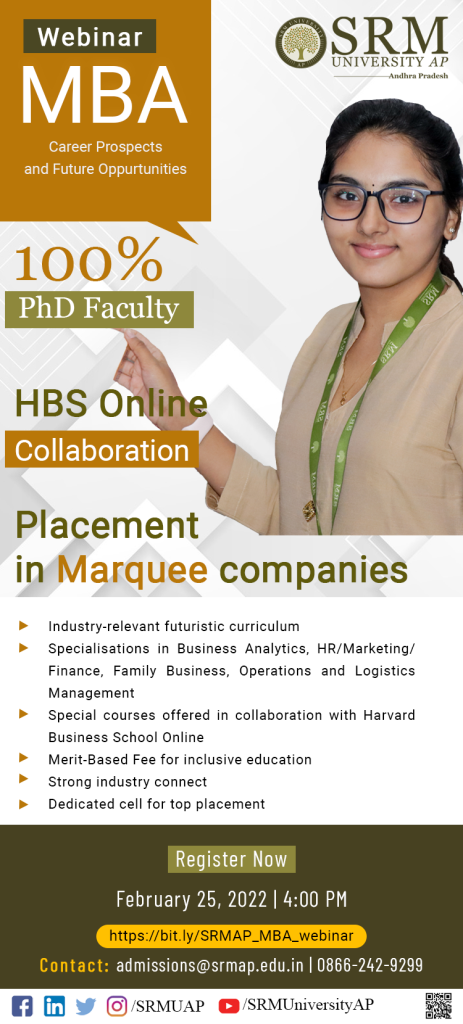 Being the world’s most popular management degree, millions of ambitious students are enrolling in MBA programmes both inside and outside the country. An MBA degree is open to graduates in any discipline, supplementing their career prospects. A wide array of MBA courses introduces students to different facets of business and imparts them the necessary skills to hold management and leadership positions in any field of work. Having countless colleges to choose from, serious thought must be given to choosing the right university for an MBA programme. SRM University- AP is organising a webinar on MBA at SRM AP – Career Prospects and Future Opportunities on February 25, 2022, at 4.00 PM to know more about the career paths an MBA graduate of our university can embark on.
Being the world’s most popular management degree, millions of ambitious students are enrolling in MBA programmes both inside and outside the country. An MBA degree is open to graduates in any discipline, supplementing their career prospects. A wide array of MBA courses introduces students to different facets of business and imparts them the necessary skills to hold management and leadership positions in any field of work. Having countless colleges to choose from, serious thought must be given to choosing the right university for an MBA programme. SRM University- AP is organising a webinar on MBA at SRM AP – Career Prospects and Future Opportunities on February 25, 2022, at 4.00 PM to know more about the career paths an MBA graduate of our university can embark on.The School of Entrepreneurship and Management Studies at SRM University-AP aims to nurture entrepreneurs and business professionals who can create a difference in global management practices. A comprehensive curriculum designed after understanding the best management practices and industry-relevant professional skills enables students to keep abreast of the latest developments in the realm of business. Collaborating with universities of international repute will also give them an opportunity to take up high-impact online courses and familiarise themselves with innovative study approaches.
Join the webinar on MBA at SRM AP – Career Prospects and Future Opportunities to explore the exciting opportunities that await you.
Continue reading → - SRMAP receives SWAYAM-NPTEL ‘A’ rating February 23, 2022
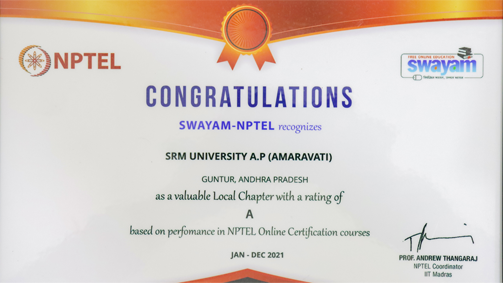 SRM University-AP is happy to announce that it was recognised by NPTEL SWAYAM as a valuable local chapter with an ‘A’ rating for the year Jan-Dec 2021. The rating is based on the performance of students who took the examinations for various SWAYAM courses.
SRM University-AP is happy to announce that it was recognised by NPTEL SWAYAM as a valuable local chapter with an ‘A’ rating for the year Jan-Dec 2021. The rating is based on the performance of students who took the examinations for various SWAYAM courses.SWAYAM has awarded a plaque to SRM University-AP and a certificate of appreciation to Dr Satya Pramod Jammy for his role as the university local Coordinator. It is a great achievement for the young university.
The philosophy behind this mode of education is to facilitate the curiosity of students who have an interest in the courses that transcend the conventional curriculum and give them a unique edge over their peers. SRM University-AP encourages students to study these from SWAYAM and other MOOCs available. Their performance in the examinations conducted by SWAYAM will earn them grades and credits. This was made available to the students for the first time in January 2021 which opened a plethora of opportunities to the students, and they have enjoyed this new learning possibility.
In the year 2021, a total of 470 students registered for various courses. The pass percentage is a whopping 90%, there are 17 students in the top 5%, 4 students in the top 2% and one student in the top 1% of their respective courses. 69 % (321) of the students are in Elite and higher categories. 5% students received Elite+gold award, 30% receiving Elite+silver and 35% receiving Elite certificates.
Dr Satya Pramod Jammy is pleased with all the students for their active participation and their brilliant performance. Obtaining an ‘A’ grade in the first year of implementation stands as a testament to the academic excellence of SRM University-AP. Dr Jammy is also thankful to all the department level coordinators, Dr Tapas, Dr Sreenivasulu, Dr Rajiv, Prof. Jayaseelan, Dr Malavika, Dr Ramanjaneya Reddy, and Dr Mong for encouraging the students and actively participating in the discussions. Mr V. Srinivasarao (Asst. Librarian) was instrumental in setting up SWAYAM in a short period.
Dr Jammy expressed his gratefulness to the Vice-Chancellor, Prof V. S. Rao, Deputy Dean Academic affairs Dr B. Siva Kumar and the entire University management for their support in making this a possible endeavour and its glorifying success.
- Semester Abroad Journey of Yuvraj Tankala at UC Berkeley February 23, 2022
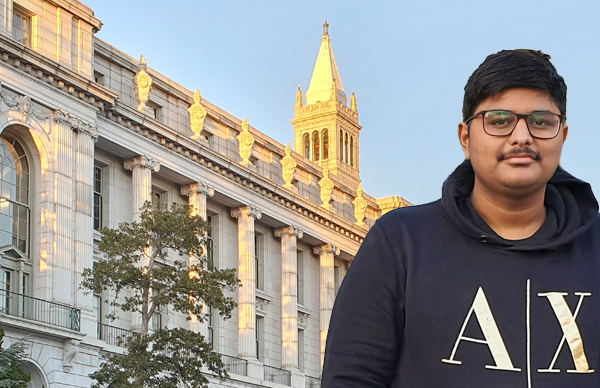 Getting the chance to study abroad is a ticket to acquiring skills that are highly sought after and will give a special and unique boost to your profile. SRM University-AP provides students with opportunities and training to join a course from a number of renowned foreign Universities to give them that unique edge that top recruiters look for.
Getting the chance to study abroad is a ticket to acquiring skills that are highly sought after and will give a special and unique boost to your profile. SRM University-AP provides students with opportunities and training to join a course from a number of renowned foreign Universities to give them that unique edge that top recruiters look for.In a long list of achievers, Yuvraj Tankala has made it into the University of California, Berkeley through our Semester Abroad Programme. Yuvaraj shared his elation with us,
“It is the spring season here; I’ll be spending solid 6 months (a semester) here at UCB to learn and explore. UC Berkeley is a one-of-a-kind university. From its history to its recent innovations in the research community, UCB has been a major player in various fields. Getting selected and sitting and writing this in the heart of the campus at UCB is really a moment to cherish. It is surely a dream come true for an ambitious person like me. Waiting for every new day to learn new things and connect with more people over here.
The selection process was smooth, SRMAP and UCB had their own prerequisites to tick off so that the whole process would be smooth. I have gone through a series of interviews, and I am tested on my entrepreneurship skills and technical skills and having a balanced academic score.
Using the teachings of here, and my skills, which I’m sure to enhance; I’m planning to use them towards my entrepreneurial mindset. These would help me satisfy the requirements of launching a potential start-up.
All these achievements would not be possible without SRM-AP’s support. The support was through constant motivation, mentoring. I would like to thank Ragunathan sir, Sonam ma’am, Ashu Abdul sir, Nagaswetha ma’am for extending their full support during the process.”
Your overseas education journey story could be next. Join SRM University-AP to receive unique educational training and career guidance through our international collaborations.
- Juxtaposing Cross-Cultural Notions of Beauty February 23, 2022
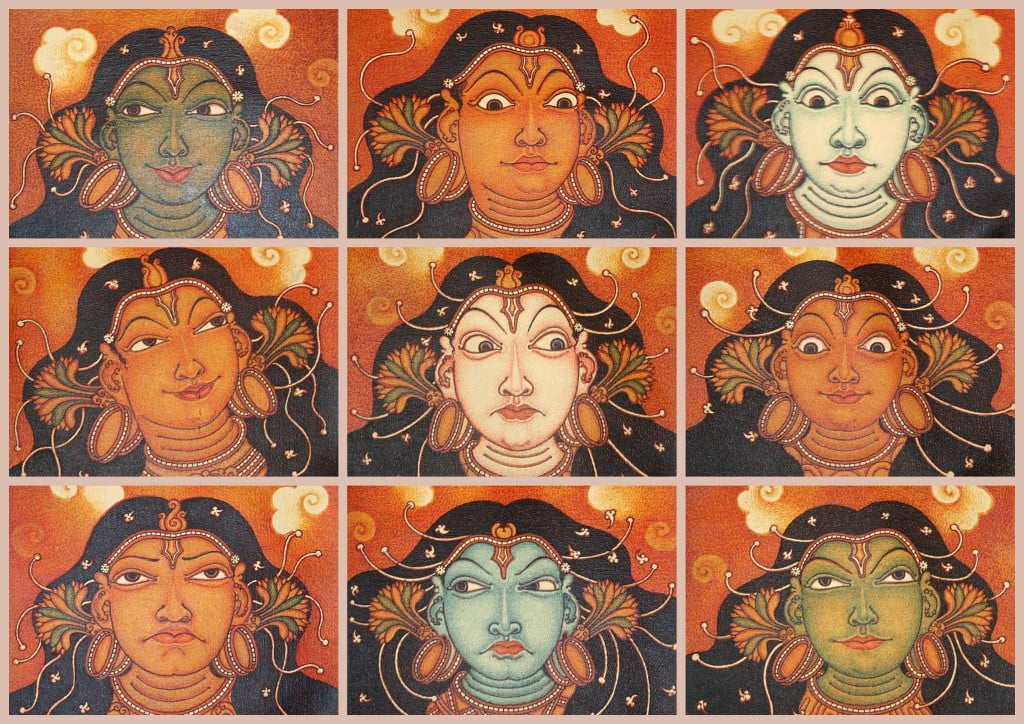 The School of Liberal Arts and Social Sciences is glad to announce that Dr Saurabh Todariya has published his paper titled “Aesthetic Delight and Beauty: A Comparison of Kant’s Aesthetics and Abhinavagupta’s Theory of Rasa” in the Journal of Dharma Studies published by Springer Nature. It is published in collaboration with Consciousness Studies Program, National Institute of Advanced Studies (IISc Campus), Bangalore.
The School of Liberal Arts and Social Sciences is glad to announce that Dr Saurabh Todariya has published his paper titled “Aesthetic Delight and Beauty: A Comparison of Kant’s Aesthetics and Abhinavagupta’s Theory of Rasa” in the Journal of Dharma Studies published by Springer Nature. It is published in collaboration with Consciousness Studies Program, National Institute of Advanced Studies (IISc Campus), Bangalore.Anything that is pleasurable to perceive is defined as beautiful. However, the notion of beauty takes different interpretations with respect to the lens it is viewed through. It is either rooted in one’s personal feelings or by virtue of something universal residing in the object. Through his paper, Dr Todariya seeks to explore this question by comparing the Philosophy of German Philosopher, Kant and the great Indian Philosopher of the 9th Century, Abhinavagupta. He proposes that appreciation of beauty is only possible when the personal and egoistic involvement is suspended with respect to the beautiful object.
The research is significant in the domain of cross-cultural philosophy and looks into aesthetics from a philosophical point of view, relatively an underexplored area in Indian Academia. Dr Todariya also aims to work on comparative aesthetics, especially on the notion of Hermeneutics and Art in Indian and Western Aesthetics in the future.
Abstract of the Research
The study aims to address the existing research gap through a thematic comparison between the aesthetics of Kant and Abhinavagupta. This paper explores Kant’s notion of aesthetic judgment based on disinterestedness with Abhinavagupta’s analysis of sādhāraṇīkaraṇa. We argue that the notions of “disinterested judgment” in Kant and sādhāraṇīkaraṇa in Abhinavagupta point towards the impersonal nature of aesthetic delight which makes the universality of aesthetic experience possible. Hence, aesthetics in both Kant and Abhinavagupta are not the personal and subjective experience, but a kind of universality based on the ability to experience impersonal joy. However, the notion of aesthetic delight in Kant is confined to the agreeable mental states only, while in Abhinavgupta the notion of rasa includes both positive as well as the negative mental states like fear, disgust, etc. In this regard, the paper will also analyse the affinity between the notion of sensus communius in Kant and sahṛdaya in Abhinavagupta which highlights the importance of aesthetic community and the impersonal nature of aesthetic delight.
- Why Choose BSc Programmes at SRMAP? February 23, 2022
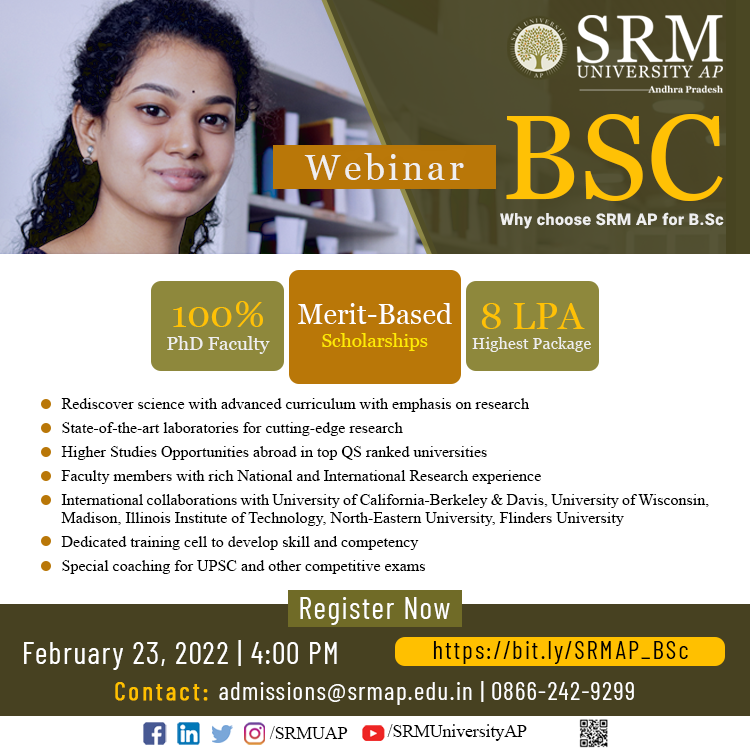 BSc is one of the most popular programmes chosen by students with an inclination towards science. BSc graduates are inundated with umpteen career choices and opportunities in the current society which has further elevated the prospects of the course. It is always worth pursuing the course if you are a student with scientific aptitude. It is even better if you could join a BSc programme that offers a revamped curriculum in line with the needs of present times. SRM University-AP is organising a webinar on Why Choose SRMAP for BSc? on February 23, 2022, at 4.00 PM for interested students to learn more about their career possibilities.
BSc is one of the most popular programmes chosen by students with an inclination towards science. BSc graduates are inundated with umpteen career choices and opportunities in the current society which has further elevated the prospects of the course. It is always worth pursuing the course if you are a student with scientific aptitude. It is even better if you could join a BSc programme that offers a revamped curriculum in line with the needs of present times. SRM University-AP is organising a webinar on Why Choose SRMAP for BSc? on February 23, 2022, at 4.00 PM for interested students to learn more about their career possibilities.SRM University-AP has been leading a new pathway for students to contribute to the best of their abilities through inventive learning programmes and research-oriented study approaches. We offer BSc programmes in Computer Science, Mathematics, Integrative Biology, Chemistry and Physics. Our BSc programmes enable students to discover the extensive range of choices they can lay their hands on. Students are also equipped to pursue higher studies in multiple fields in India and abroad. Experienced faculty members and state-of-the-art laboratory facilities will cater to the needs of students to better educate themselves and evolve into the best version of themselves.
Join the webinar on Why Choose SRMAP for BSc? to enhance your awareness of the benefits of choosing a BSc programme at SRMAP. The Webinar is scheduled to be held on February 23, 2022 at 4.00 PM.
- Launching Ceremony of Aadigyan February 22, 2022
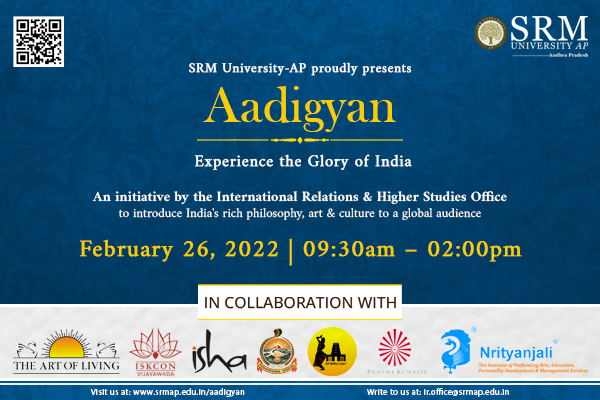 India is a treasure trove of knowledge. The International Relations & Higher Studies office at SRM University-AP cordially invites your esteemed presence to join the virtual launching ceremony of Aadigyan, an initiative to introduce India’s rich philosophy, arts, and culture to a global audience.
India is a treasure trove of knowledge. The International Relations & Higher Studies office at SRM University-AP cordially invites your esteemed presence to join the virtual launching ceremony of Aadigyan, an initiative to introduce India’s rich philosophy, arts, and culture to a global audience.Shri G Kishan Reddy, Minister of Tourism, Culture, and Development of the North Eastern Region of India will be the chief guest of the inaugural programme on February 26, 2022, at 9.30 am.
Our university is partnering with:
1. ISKCON
2. The Art of Living
3. The Temple Dance
4. Nrityanjali
5. Isha Foundation
6. Rajyoga Education & Research Foundation, Brahma Kumaris
7. Vivekananda Institute of Human Excellence, Ramakrishna Math, HyderabadYour presence and blessings will certainly pave the way for the successful launch and execution of the proposed programmes. All are invited to grace the virtual launch of Aadigyan on February 26, 2022, from 9.30 am to 2.00 pm.
Continue reading → - Dr Rupesh Kumar February 21, 2022
- M.Tech at SRM University-AP: Career Prospects and Opportunities February 21, 2022
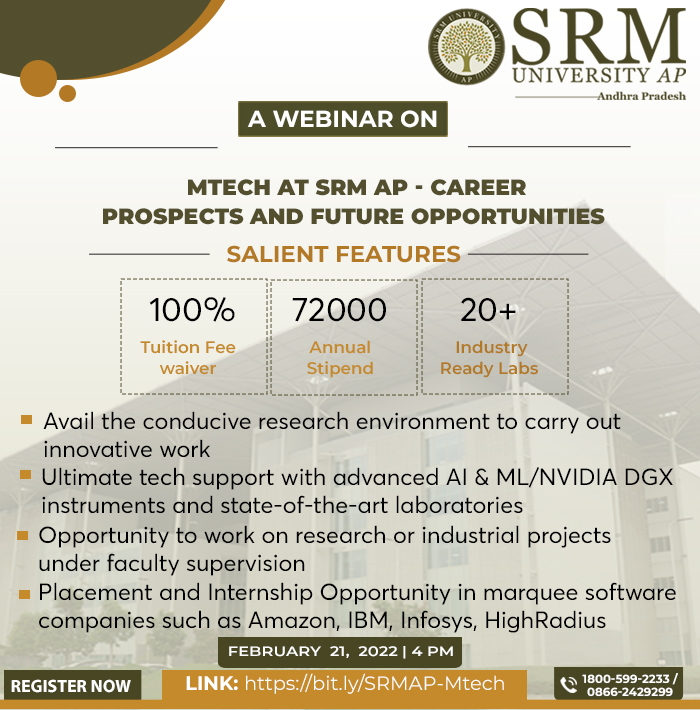 M.Tech degree is a lucrative choice for engineering graduates to augment their career possibilities in the field of science and technology. After completion of the course, they are equipped to demonstrate their expertise across multiple spheres such as research and development organizations, corporate companies, manufacturing sector, or even the academic domain. SRM University-AP is organizing a webinar on MTech at SRM AP – Career Prospects and Future Opportunities on February 21, 2022, at 4.00 PM for interested students to learn more about their career possibilities.
M.Tech degree is a lucrative choice for engineering graduates to augment their career possibilities in the field of science and technology. After completion of the course, they are equipped to demonstrate their expertise across multiple spheres such as research and development organizations, corporate companies, manufacturing sector, or even the academic domain. SRM University-AP is organizing a webinar on MTech at SRM AP – Career Prospects and Future Opportunities on February 21, 2022, at 4.00 PM for interested students to learn more about their career possibilities.SRM University-AP, a pioneering educational institute aims to spearhead a revolutionary pathway for the M.Tech graduates to qualify themselves ahead of time. The School of Engineering and Sciences (SEAS) at SRM-AP offers post-graduation in various streams such as: Computer Science and Engineering, Electronics and Communication Engineering, Mechanical Engineering, Electrical and Electronics Engineering and Civil Engineering. The Inter-Disciplinary Experiential Active Learning (IDEAL) programme is a novel approach of ours that facilitates students to take specializations across disciplines and shape themselves to navigate different areas of activity from Information Technology to Robotics, Construction and other industries.
Join the webinar on MTech at SRM AP – Career Prospects and Future Opportunities to gain a better insight into infinite opportunities awaiting the aspirants. The programme is scheduled to be held on February 21, 2022, at 4.00 PM.
Continue reading → - Celebration of Our Linguistic and Cultural Diversity February 21, 2022
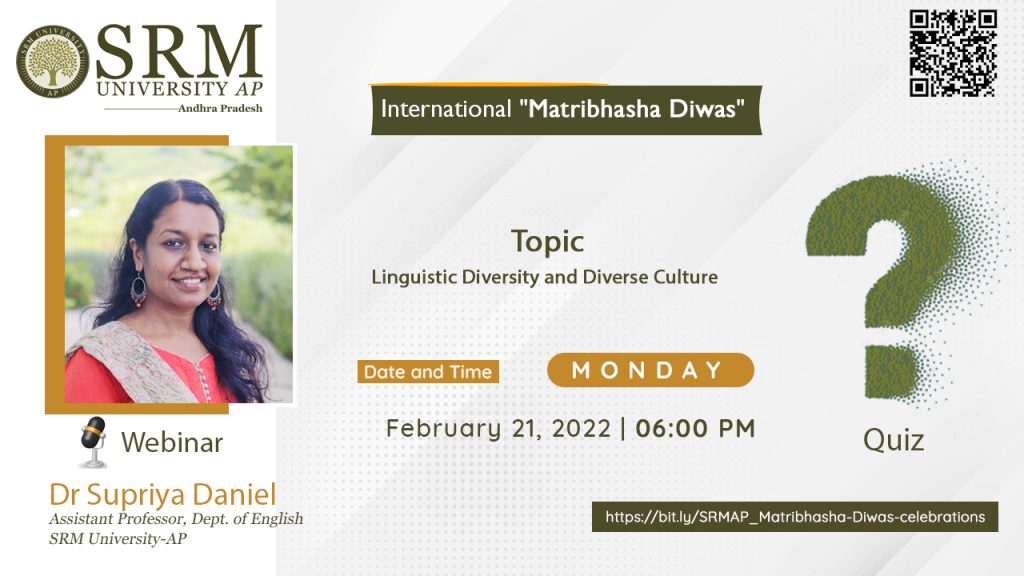 Linguistic and Cultural heritage plays an integral role in the way you define yourself and the world around you. You may learn hundreds of languages, experience myriads of cultures, yet the influence of your motherland and mother language will forever reflect in every aspect of your life. Being in a multicultural world, it is of vital importance to preserve all tangible and intangible elements of your heritage. Matribhasha Diwas or International Mother Language Day celebrated on February 21 is a well-thought-out initiative of UNESCO to promote awareness of linguistic and cultural diversity across the globe.
Linguistic and Cultural heritage plays an integral role in the way you define yourself and the world around you. You may learn hundreds of languages, experience myriads of cultures, yet the influence of your motherland and mother language will forever reflect in every aspect of your life. Being in a multicultural world, it is of vital importance to preserve all tangible and intangible elements of your heritage. Matribhasha Diwas or International Mother Language Day celebrated on February 21 is a well-thought-out initiative of UNESCO to promote awareness of linguistic and cultural diversity across the globe.The Department of Student Affairs is organising a webinar and quiz competition on ‘Linguistic Diversity and Diverse Culture’ with Dr Supriya Daniel, Assistant Professor, Department of English, SRM-AP. This is an exciting opportunity for students to learn more about the essentiality of their linguistic and cultural legacy.
Date: February 21, 2022
Time: 6.00 PM IST
Don’t miss out on this opportunity to enlighten yourselves about the worth and glory of your heritage. Join the celebration.

